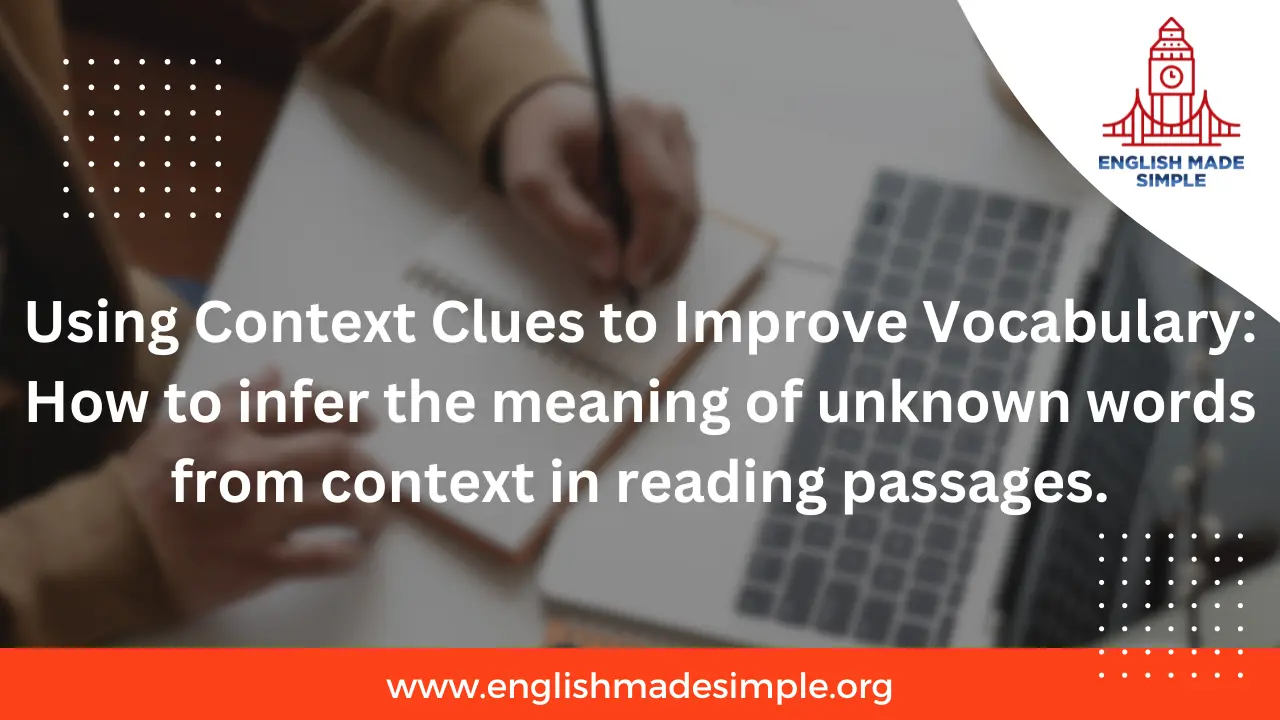
Using Context Clues to Improve Vocabulary: How to Infer the Meaning of Unknown Words from Context in Reading Passages
Expanding your vocabulary is essential for improving reading comprehension and communication skills. One effective way to learn new words is by using context clues—hints found within the surrounding text that help infer the meaning of unknown words. This blog will explore various types of context clues and provide strategies to enhance your vocabulary through reading passages.
Types of Context Clues
Definition Clues:
- The unknown word is directly defined in the sentence or nearby sentences.
- Example: “The arboreal, or tree-dwelling, creatures were fascinating to watch.”
- Arboreal is defined as “tree-dwelling.”
Synonym Clues:
- A synonym of the unknown word is used to provide a clue.
- Example: “The weather was balmy, warm and pleasant, perfect for a picnic.”
- Balmy is synonymous with “warm and pleasant.”
Antonym Clues:
- An antonym or contrast to the unknown word is provided.
- Example: “Unlike his gregarious brother, who loved parties, he was quite introverted.”
- Introverted is the opposite of “gregarious,” meaning shy or reserved.
Example Clues:
- Specific examples are given to illustrate the meaning of the unknown word.
- Example: “Celestial bodies, such as the sun, moon, and stars, have fascinated humans for centuries.”
- Celestial relates to “the sun, moon, and stars.”
Explanation Clues:
- The unknown word is explained through additional details in the sentence.
- Example: “The company faced a debacle, an utter failure, after the product recall.”
- Debacle is explained as “an utter failure.”
Inference Clues:
- The meaning is inferred from the overall context and background knowledge.
- Example: “After the cataclysmic event, the city lay in ruins, and the survivors were desperate for help.”
- Cataclysmic can be inferred as something causing great destruction.
Strategies for Using Context Clues
Read the Entire Sentence:
- Focus on the sentence containing the unknown word. Sometimes, the meaning is directly provided or can be inferred from that sentence alone.
Read Surrounding Sentences:
- Look at the sentences before and after the unknown word. They often provide additional clues or context.
Look for Signal Words:
- Identify signal words that introduce definitions, synonyms, antonyms, or examples. Words like “such as,” “or,” “like,” “unlike,” “but,” and “although” can be indicators.
Break Down the Word:
- Analyze the word for prefixes, suffixes, and root words. Understanding these components can provide hints about the word’s meaning.
Use Background Knowledge:
- Apply what you already know about the topic to help infer the meaning of the unknown word.
Re-read and Verify:
- After making an inference, re-read the passage to ensure that the inferred meaning makes sense within the context.
Practice Exercise
Let’s practice using context clues with the following passage:
“The expedition faced numerous perils during their journey through the dense jungle. Venomous snakes, treacherous terrain, and sudden thunderstorms posed constant threats. Despite the dangers, the team remained undaunted, driven by their quest for the elusive ruins.”
Question: What does the word perils most likely mean in this context?
Using Context Clues:
- Read the Entire Sentence: The expedition faced numerous perils during their journey through the dense jungle.
- Read Surrounding Sentences: Venomous snakes, treacherous terrain, and sudden thunderstorms posed constant threats.
- Identify Signal Words: The word “numerous” indicates multiple instances of something, and the examples provided (snakes, terrain, thunderstorms) are dangerous.
- Infer Meaning: Perils likely means dangers or threats.
Answer: In this context, perils means dangers or threats.
Benefits of Using Context Clues
- Enhanced Reading Comprehension: Understanding the meaning of words through context improves overall comprehension.
- Independent Learning: You can infer meanings without constantly relying on a dictionary.
- Vocabulary Expansion: Regular practice with context clues helps you learn and retain new words.
- Critical Thinking: Using context clues develops analytical and inferential thinking skills.
Conclusion
Using context clues is a powerful strategy to improve vocabulary and reading comprehension. By practicing the identification and application of different types of context clues, you can become a more proficient reader and communicator. Remember, the key is to pay attention to the surrounding text and use the information provided to make educated guesses about the meanings of unfamiliar words. Happy reading!
